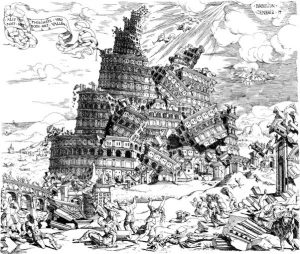“What does the Tower of Babel represent?” (Quora)
 Michael Laitman, On Quora: “What does the Tower of Babel represent?“
Michael Laitman, On Quora: “What does the Tower of Babel represent?“
The construction of the Tower of Babel represents humanity’s first level of egoistic development that took place around 4,000 years ago.
The story of the Tower of Babel describes people who, out of increased egoism, aspired to reach the governing altruistic force of reality, the Creator, which is allegorically described by their desire to build a tower that reached to the sky.
Humanity failed to direct its increased egoism toward the Creator’s attainment, because attaining the Creator means rising above egoism and developing contact with the altruistic force that governs reality. Their increased egoism made them stop feeling each other and their positive connections. It made them want to exploit the Creator, which is the meaning of building a tower that reaches the sky. They subsequently stopped understanding each other, and their oppositeness from nature alienated them from each other and from the Creator, and they dispersed.
In other words, the Tower of Babel represents a process of whereby we receive a growth of egoism—the desire to enjoy for self-benefit alone—which detaches us from each other and from nature. Instead of working to unite above our increased egoism and correct the disconnection that our egoism brings upon us, the Tower of Babel story discusses people who thought that they would be able to attain the Creator through their egoism, and not by rising above it. As a result, they experienced a collapse of the positive connection that they shared before their egoism’s growth spurt, and they started feeling hatred and separation from each other instead of feeling that they belonged to one nation.
Since then, we might have compensated for our detachment with various scientific, cultural and technological developments, but while we have developed superficial connections to each other globally, our inner detachment from one another continues growing due to our continually-growing egoism. We also find today that our abundance of scientific, cultural and technological innovations fail to give our desires any real lasting satisfaction, which is exemplified by the fact that our era has the most cases of depression, loneliness, anxiety and stress than any other one.
In our current era, we are reaching the realization that we simply cannot fulfill ourselves, i.e. our egoistic desires. Any fulfillment merely serves to extinguish our current desire, and a new desire appears in its place. The growing awareness of our egoism’s dead-end in our era shows us a new phase of the Tower of Babel: Where the Tower was once destroyed by the Creator, today we are reaching our own realization of its destruction the more we see our egoistic desires leading us to a dead end instead of to the progress that we once thought they would lead us to. In other words, we are at a similar juncture that occurred in the time of Babel, only now we are aware of our situation.
According to the wisdom of Kabbalah, the meeting point of our increasing global technological, economic and commercial connection, together with our increasing inner egoistic growth and detachment in our attitudes to each other, marks the beginning of humanity’s connection into a new united civilization. We can learn from our past experiences and from the Tower of Babel’s story that if we follow the commands of our growing egoism, we will be led to destruction. In order to correctly realize our egoism’s growth, we need to learn how to unite as a single humanity above our growing egoism, which will lead us to a new harmonious and peaceful state the likes of which we have never seen before. It is my hope that we will gain wisdom and awareness and go the latter route sooner rather than later, and by so doing, spare ourselves and our future generations a lot of unnecessary suffering.
[307880]

Based on the book, A Guide to the Hidden Wisdom of Kabbalah, 3rd Edition, by Kabbalist Dr. Michael Laitman. Written/edited by students of Kabbalist Dr. Michael Laitman.







Discussion | Share Feedback | Ask a question